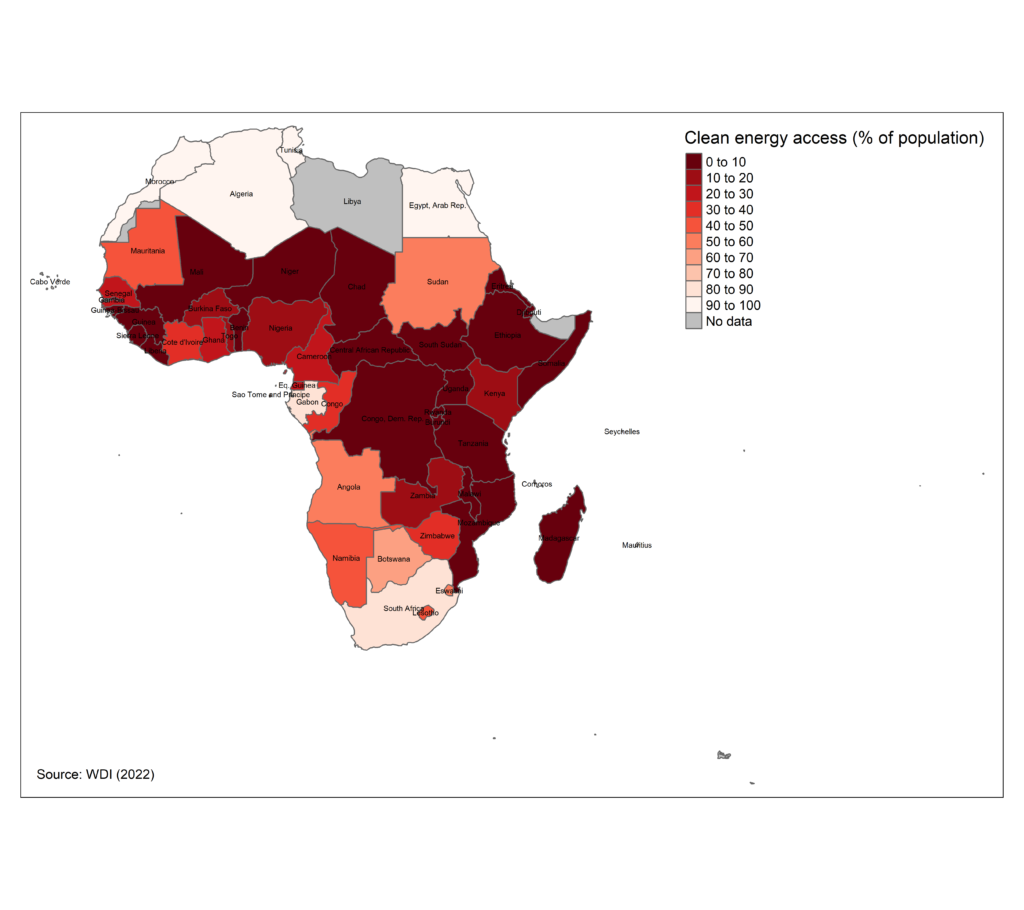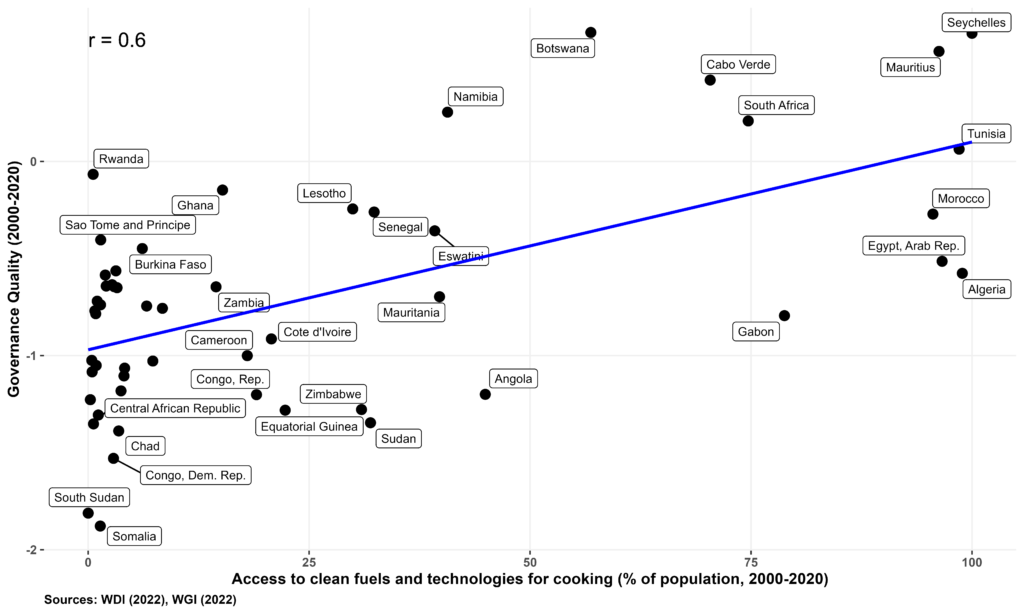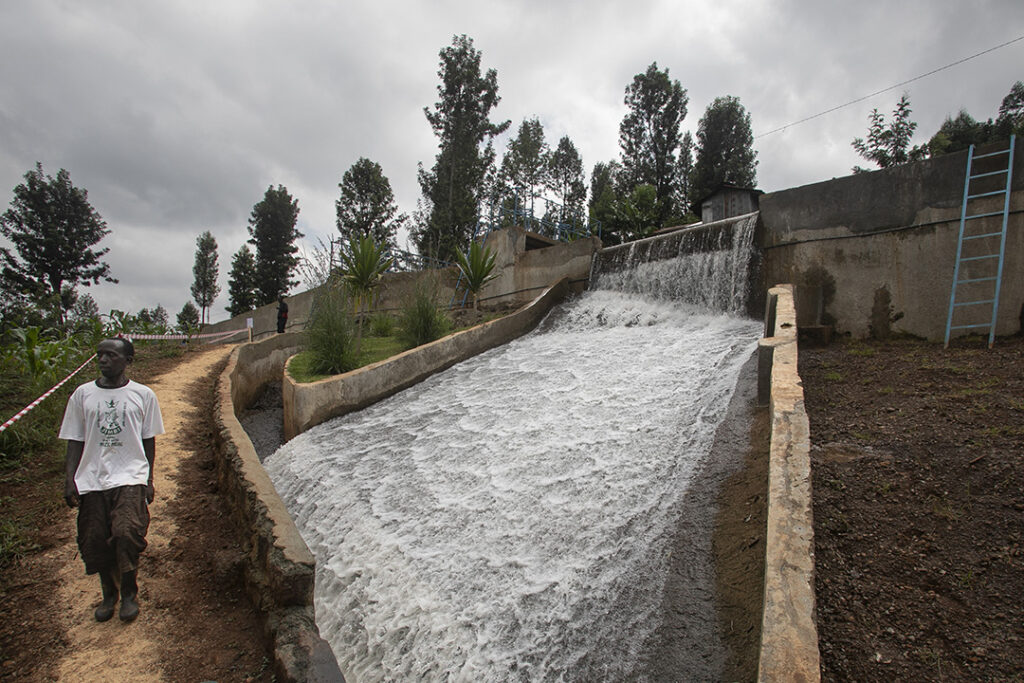In recent years, the global call for a just energy transition has grown louder as concerns over climate change, environmental degradation, and the need for access to equitable clean energy intensify. However, the reality, as depicted in Figure 1 of this article, remains that numerous African countries still face a deficit in terms of clean energy access for their populations. In 2020, Africa had a clean energy access rate of 29.08%, while the global rate was 69.57%. Despite these challenges, data for the past two decades in Africa have revealed the emergence of good governance as a pivotal driving force in achieving a just energy transition and reaping its multitude of benefits.
In Africa, the pursuit of a just energy transition is driven by the need for sustainable development and access to clean and renewable energy. Consequently, many African countries are actively working to address climate change, enhance energy security, and foster socioeconomic development. Notably, South Africa recently launched a significant long-term Just Energy Transition Partnership (JETP) with international allies to support its decarbonisation efforts. Nevertheless, the achievement of these ambitious goals hinges on several critical factors, including the robustness of domestic political institutions.

The importance of good governance in the context of the just energy transition cannot be overstated. Good governance encompasses essential values such as transparency, accountability, inclusive decision-making, and efficient resource management. Moreover, it involves strengthening institutional capacity, upholding the rule of law, enhancing regulatory frameworks, ensuring political stability, and embracing adaptive governance practices. These critical elements empower nations to navigate evolving challenges, drive sustainable development, and pave the way for a greener future.
By integrating the principles of good governance into the just energy transition, African countries can surmount barriers and unleash the transformative potential of clean energy. Strong domestic political institutions provide an enabling environment that encourages the active involvement of all stakeholders in shaping the energy transition. This integration serves as a powerful catalyst for sustainable development, access to clean energy, and the advancement of Africa’s socioeconomic landscape.
Analogous to an orchestra, the journey towards clean and renewable energy involves multiple stakeholders, each playing a unique instrument in an intricate symphony. Government officials, energy companies, environmental organisations, and local communities all contribute their perspectives, interests, and resources to the energy transition orchestra. Through effective governance that harmonises their efforts, a just and sustainable energy future can be achieved for Africa and beyond.
In this analogy, good governance assumes the role of the conductor guiding the symphony of the just energy transition. Just as a skilled conductor coordinates the musicians, sets the tempo, and harmonises the different sections, good governance provides the necessary coordination, direction, and harmony in the pursuit of a greener future. It achieves this by creating an enabling environment through clear policies, regulations, and frameworks that support clean energy initiatives. This alignment of stakeholder interests fosters collaboration and ensures a smooth and harmonious progression of the energy transition.
Furthermore, good governance establishes mechanisms for transparency and accountability, ensuring that policies and programmes are held to scrutiny if they fail to yield desired outcomes and safeguards public resources from being misappropriated for private gains. It also fosters the equitable distribution of clean energy resources and benefits across society. By prioritising social justice and equality, governance frameworks address the needs and concerns of marginalised communities. Inclusive decision-making processes ensure that the benefits of clean energy reach those who need them the most, leaving no one behind in the transition to a greener future.
Just like a conductor guides the orchestra to create a symphony that resonates with the audience, good governance ensures that the just energy transition produces harmonious and impactful outcomes. By coordinating the efforts of various stakeholders, good governance sets the tempo for progress and ensures that all sections of society are playing in tune towards a shared vision of a sustainable and just energy future.
Shifting our focus from the metaphorical orchestra to the real world, what effects does governance quality have on the just energy transition in Africa? In this context, “governance quality”, as University of the Witwatersrand Professor Rod Alence puts it, refers to the effectiveness of the state in formulating and implementing public policy while safeguarding public resources from private interests. To measure governance quality, an index based on government effectiveness and control of corruption variables was constructed, covering the period from 2000 to 2020. The just energy transition, on the other hand, was measured as the percentage of the population in African countries with access to clean fuels and technology for cooking between 2000 and 2020. All data sets were sourced from the World Bank’s databases.

Figure 2 presents compelling evidence underscoring the significance of good governance in driving the just energy transition. The findings reveal a notable relationship between governance quality and the accessibility of clean fuels and cooking technology among African populations. The trend line clearly demonstrates that over the past two decades, countries with better governance quality had a substantial percentage of their population with access to clean energy solutions. Conversely, countries with inadequate governance, akin to poorly skilled conductors overseeing the symphony of the energy transition, exhibited lower levels of clean energy accessibility. In essence, good governance acts as a powerful catalyst for achieving a greener future. These results remained consistent even after controlling for potential confounding factors such as gross domestic product per capita and access to electricity (% of the population) through multivariate linear analysis.
The empirical evidence provided above reinforces the critical role of good governance in promoting a just energy transition. It highlights the direct relationship between effective governance and improved access to clean energy resources for African populations. As countries enhance their governance practices, they not only strengthen the foundation for sustainable development but also enable a more equitable distribution of clean energy benefits. By effectively managing resources, promoting transparency and accountability, and engaging in inclusive decision-making processes, nations can ensure that the symphony of the just energy transition resonates harmoniously, leading to a greener and more sustainable future for all.
Seychelles and Cabo Verde are remarkable examples of African countries with strong political institutions leading the just energy transition. Seychelles achieved 100% electricity and clean energy access for its population through significant investments in wind and solar power, while Cabo Verde prioritised renewable energy in response to rising energy prices and forged partnerships with Luxembourg, Germany, and the World Bank for funding. Cabo Verde now boasts nearly universal household electrification, with clean energy access for its population reaching 94.4% in 2020. These examples highlight the transformative potential of good governance in shaping a greener future.
As we envision the orchestra of transition working in unison, guided by the skilled conductor of good governance, a greener and more sustainable future becomes attainable. By embracing transparency, accountability, and effective political institutions, we can create an environment where the symphony of transition plays in harmony, ensuring that the benefits of clean energy reach all segments of society. With good governance as the guiding force, as data shows, a greener future is possible.

Nnaemeka is a Senior Data Analyst at Good Governance Africa. He holds a Master’s degree in e-Science (Data Science) from the University of the Witwatersrand, funded by South Africa’s Department of Science and Innovation. Much of his research explores socio-political issues like human development, governance, bias, and disinformation, using data science. He has published research in scholarly journals like EPJ Data Science, Politeia, the Journal of Social Development in Africa, and The Africa Governance Papers. He has experience working as a Data Consultant at DataEQ Consulting. He has also taught at the Federal University, Lafia (Nigeria) and the University of the Witwatersrand, Johannesburg (South Africa).



